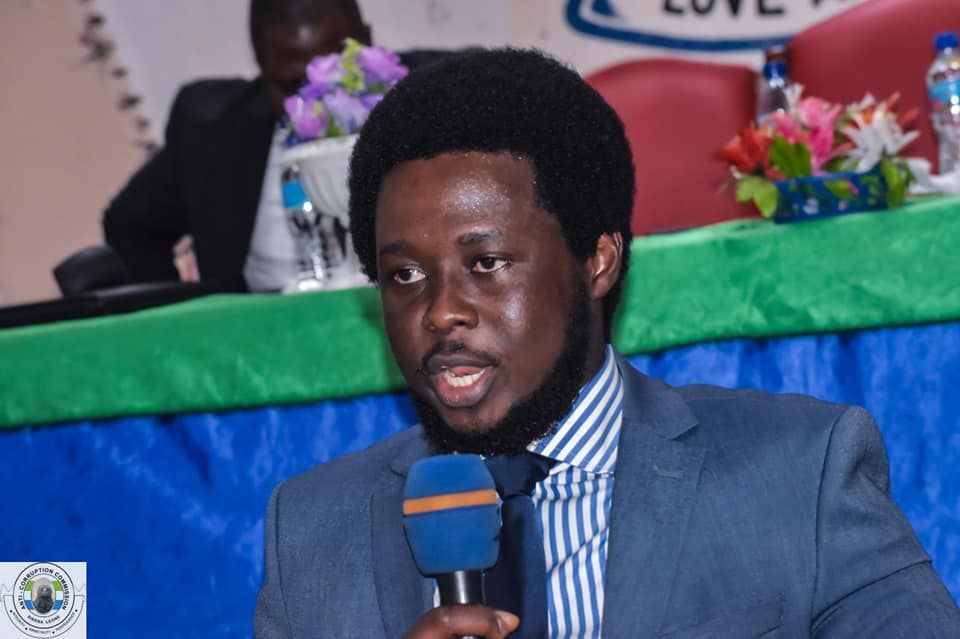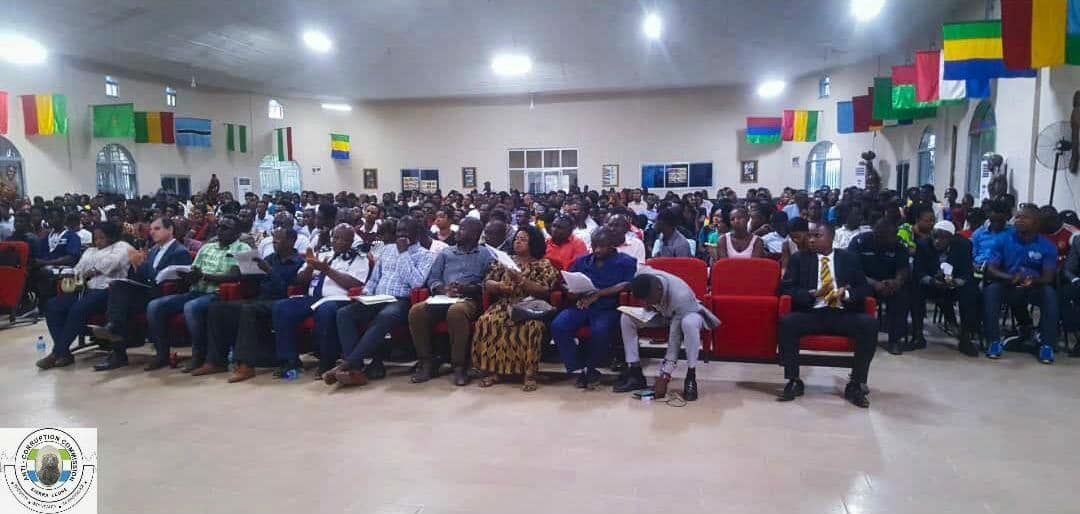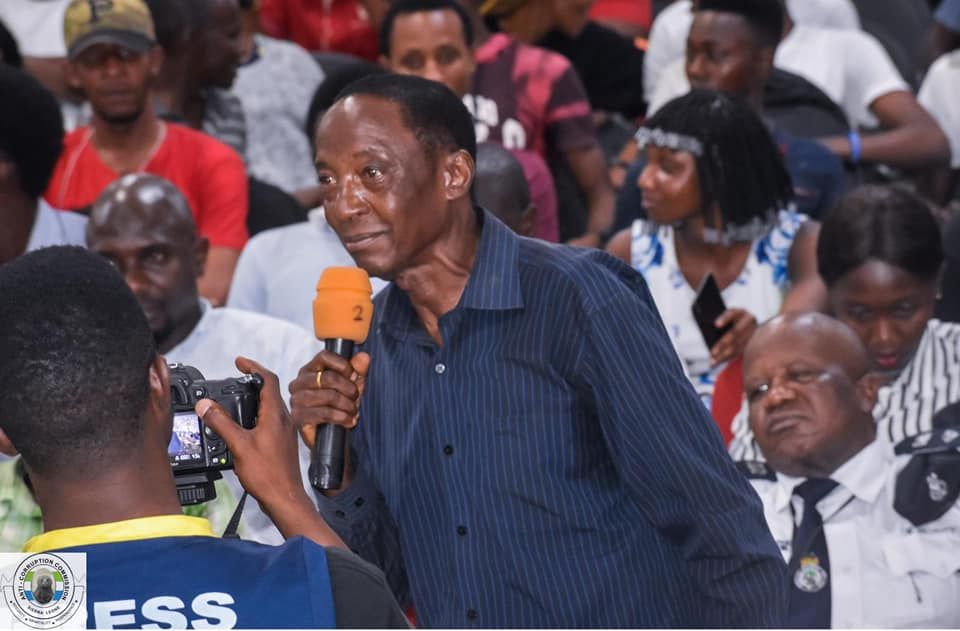“REINFORCING THE ANTI-CORRUPTION WAR IN THE EDUCATION SECTOR: THE ROLE OF TERTIARY INSTITUTIONS ( STUDENTS AND ADMINISTRATION) IN THE FIGHT AGAINST CORRUPTION”
A PUBLIC LECTURE DELIVERED BY FRANCIS BEN KAIFALA, THE COMMISSIONER OF THE ANTI-CORRUPTION COMMISSION OF SIERRA LEONE AT THE UNIVERSITY OF MAKENI ON 17TH FEBRUARY, 2020.
INTRODUCTORY COURTESIES
All Protocols Observed, Distinguished Ladies and Gentlemen.
I stand here today, humbled by the task to lead the national campaign against corruption in Sierra Leone, grateful for the trust the people have bestowed on me, and mindful of the sacrifices we have to make to defeat the scourge of corruption in Sierra Leone.
For this, I thank His Excellency, President Dr. Julius Maada Wonnie Bio, President of the Republic of Sierra Leone for appointing me. I thank him for his service to our nation, and his dedication and Presidential Will to fight and control corruption. In this journey, we in academia must remain faithful to the ideals that we have dreamt of and which, in most countries, we have watched our fore bearers betray leaving our countries beggarly and dependent on others. To properly contribute to our country’s development, here is what everyone of us has to understand:
SETTING THE CONTEXT
This invite comes at a time when the national development plan lays emphasis on Human Capital Development with quality education being emphasized at all levels. We have a President, whose vision for the socio-economic transformation of Sierra Leone is firmly built on developing an educated population to lead the rebirth of Sierra Leone.
For a country that was once referred to as the Athens of West Africa, the choice of topic for this lecture is very apt; mainly because it is now very clear to all citizens that the values and hallmarks of integrity, discipline and excellence that characterized our educational system has been consistently eroded over the years. In fact, it had deteriorated to the brink of collapse.
THE ECONOMIC CONTEXT
It is important to note that since the rise of the Anti-Corruption agenda in the mid-1990’s, a wide range of reports, conventions and legislation have emerged, aimed at both enforcing and promoting transparency, integrity and accountability particularly in developing countries.
Nonetheless, despite the relative widespread implementation of Anti-Corruption reforms and institutional solutions in Africa for example, no more than 21 countries in Africa have enjoyed a significant decrease in corruption levels since 1996, while at the same time 27 countries have become worse off. The same could be said of Sothern American and many Asian countries.
For a successful approach to preventing corrupt and morally reprehensible behavior, in addition to punitive and institutional measures, we also need to understand and challenge the determinants of corrupt before tackling the illegal or otherwise anti-social behavior. It is important to highlight that, from the basic to university levels, curricula typically lack components that would contribute to a non-tolerance of such conduct thereby developing a continuing generation of young people who do not sufficiently understand the cancerous effect and implications of the monster called corruption that has mostly become culturized.
Adding to that, austerity measures often strike particularly hard against those unconnected with the causes of the crisis, which may further lead to an erosion of both trust and legitimacy in our democratic institutions.
Trust should be viewed as a social capital springing from the understanding that it is closely connected with economic efficiency and growth. As a collective attribute, social capital can loosely be defined as networks and norms that facilitate cooperation and collective action. Our Universities are the hub for that to be cultivated.
As Nelson Mandela once put it, a country’s future is only as promising as its next generation of citizens, and, in his words, “we can no longer sit and watch while many of our country’s children are held back in the mire of ignorance and lack of skills.” If we are serious about development and progress, we must restore the country to what it once was educationally—the “Athens” of West Africa. Only then, we can consider ourselves to be closer to being ready to bring about socio-economic transformation within the “New Direction”.
To start promoting social capital we need to address “the causes behind the causes” – that is, the determinants of corrupt behavior. It seems likely that such behavior has its roots in the value systems of decision-makers at various levels within the public and private sector, many of whom have been educated at our universities – where little emphasis is placed on ethical citizenship.
A NEW APPROACH
From the numerous interactions from which we infer our trust in others, it is clear that reaching out only to students of law and public policy will fail to have the desired effects.
Our banker is likely to be an economist; engineers are often central in public procurement; doctors, nurses and administrators alike are all points of contact in the health sector. Thus, for universities or students to optimize their roles as drivers of change towards social capital, health and well-being, a ‘whole--university’ promotion of integrity and accountability training is needed.
We recognize the university sector’s potential, as well as its responsibility to help shape the moral contours of society for the better. I call on institutions of higher education to:
1. Endorse a cross-faculty approach to include components of ethics and anti-corruption in curricula.
2. Encourage and facilitate the incorporation of ethics issues within their classes.
3. Appreciate the opportunity to shape professional identities, which set the boundaries of future acceptable behavior.
4. 'Talk the talk' and 'walk the walk' – that is, in addition to educating on ethical behavior it is crucial that universities – as agents providing a public good – themselves act accordingly, ensuring impartiality in teaching, student assessment and research and that matters regarding the award of degrees, employment and promotions are based on transparent and objective criteria not politics and other considerations.
Through these initiatives, higher education can play its part in the global fight against corruption and take the lead in the social transformation of Sierra Leone with lasting impact.
THE WAR ON CORRUPTION
With all these in mind; and mindful of the fact that the educational sector is yet to catch up, when I was appointed Commissioner, I redirected the vision of the ACC in what I call the “Radical Transparency Drive.” The object is to reverse the gains of corruption faster and more accurately. Youths are leading the way in my strategy. This approach constitutes a comprehensive method of fighting corruption, focusing on nine pillars: the youths and young people; Public awareness; anti-corruptions strategies; public participation; ‘watchdog’ agencies; the judiciary; the media; the private sector; and international cooperation.
With these principles as our gateway, we have introduced a robust attitude to the fight against corruption. Corruption is WAR. The only way to win a war is to confront the enemy. We have taken the war to the corrupt. We shall continue to raid corrupt actors, hit them through well planned and unsuspecting sting operations. We have increased and made effective our intelligence gathering processes, including the use of Confidential Human Intelligence Sources across all MDAs and Universities. We have also embarked on chasing the money and returning it to the state in addition to punishments.
We have set the foundation to make corruption a very high risk and low return venture. On Thursday 31st October 2019, the Sierra Leone Parliament passed the Anti-Corruption Amendment Act 2019 which provides, among other things, increased penalties for offences under the Act; strengthens protection for witnesses and whistleblowers; provides the ACC with alternatives to prosecution; widens the scope of corruption to include that the accused ‘offered’, ‘solicited’, ‘obtained’ or ‘received’ in addition to ‘gave and accepted’ an advantage; reduces the year-long requirement that persons who cease to be public officers have to file a declaration in respect of their assets; provides for administrative sanctions for public officers who fail to submit their asset declaration forms or knowingly record false, inaccurate or misleading information in the forms; introduces trial of those accused of corruption in absentia; limits the scope of public officer to declare their assets and imposes sanctions for non-compliance; and vests in the ACC Commissioner power to direct that contracts with elements of corruption in their processing may not be proceeded with after agreement with the National Public Procurement Authority.”
As Students and Faculty, we all should know we are in the midst of a crisis. Our nation is at war against corruption. Corruption has violently wrecked our economy; and has made Sierra Leone a reputational risk. This has effectively undermined Foreign Direct Investment and growth. Corruption led to the decade-long war; as a consequence of greed and irresponsibility on the part of many politicians, but also our collective failure as a nation to make hard choices and prepare the country to succeed. Lives have been lost; limbs have been mimed, businesses have been shuttered; our healthcare is failing; too many learning institutions are failing; and each day brings further evidence to show that if we fail to tackle corruption; we will continue to fail as a country.
Nonetheless, there is a new feeling; profound levels of confidence, as evidenced in the MCC score, the recently released Afro-Barometer report, the Transparency International Index; the IGR survey; and all other indexes and surveys that the country is turning things for the better. We made huge progress in the MCC and was number three the in Barometer, incredibly ahead of Botswana, showing that progress is inevitable, and that you the Youths should be the next generation of anti-corruption crusaders.
THE RALLYING CALL
Today, I say to you, as a country and people, the challenges corruption poses are real. They are serious and many. They will not be met easily or in a short span of time. But know this, Sierra Leone must defeat corruption. For this country, we must choose hope over fear, unity of purpose over conflict; and concertedness over discord.
For us, we have suffered war, poverty, illiteracy, among others, mainly as a consequence of corruption. We shall continue to fight. We shall never tire. For everywhere we look to pursue corruption, there is work to be done. Therefore, I call for action to lay a new foundation for the growth, and prosperity of Sierra Leone. Even if we build the roads and bridges, the electric grids and digital lines that feed our commerce and bind us together, we shall fail if we fail to fight corruption.
CONCLUSION
Corruption, a common danger in our lifetime, must be eliminated or controlled. With hope and virtue, let us brave the rains, the sun, and endure what storms may come, but we must fight corruption so that our grandchildren, and their children, shall know that when we were tested, we refused to let this journey end, that we did not turn our backs nor did we falter. We shall carry forth the fight for future generations. That fight for transformation starts with us in the universities.







